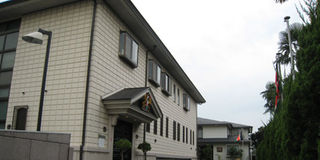New probe launched into Tokyo embassy scandal

Photo/FILE
The embassy in Tokyo, Japan. A damning report that sent Mr Wetang’ula to the cold for nearly a year made harsh accusations against him, calling on him to step aside and proposing that he be barred from holding public office if found guilty.
A fresh round of investigations has been launched into the controversial Sh1.1 billion scandal in the purchase of Kenya’s embassy in Tokyo (above).
Anti-corruption detectives flew out to Japan on Tuesday to open up the second phase of the investigations, which could again thrust to the spotlight the reinstatement of Foreign Affairs minister Moses Wetang’ula to his docket in August. (READ: Embassies scam: The Sh2.5bn question)
Mr Wetang’ula’s permanent secretary Thuita Mwangi was also allowed back in office before the Ethics and Anti-Corruption Commission (EACC) cleared him of any wrongdoing.
The departure of the investigators to Japan is a firm confirmation that President Kibaki and Prime Minister Raila Odinga reinstated the officials back in office before they were cleared of corruption allegations against them.
More egg would be left on their face if the international investigations end up linking the Foreign Affairs officials to the scandal, and put them in an embarrassing situation considering the strict provisions on integrity under the new constitution.
MPs had vehemently questioned the move to reinstate Messrs Wetang’ula and Mwangi before they were fully cleared over their alleged role in the scandal was heavily questions. (READ: MPs object Wetang'ula Cabinet return)
On Friday, Nation established that the fit-again EACC dispatched two investigators to Tokyo to open up the investigations.
The investigators flew out on Tuesday evening and arrived in the Asian country on Wednesday.
They were expected to embark on the business immediately with an aim of coming up with a report that can supplement the local investigations which were completed a while ago.
It is believed the local investigations, which did not directly link the Messrs Wetang’ula and Mwangi to the scandal were the basis upon which President Kibaki and Mr Odinga relied on to recall the two.
But the EACC, then called Kenya Anti-Corruption Commission, said the investigations had not been completed and could thus not be the reason the authorities asked the minister and his PS to resume duty.
There was no way, the commission said, that the internal and international investigations could be separated in any decision-making.
Agency spokesman Nicholas Simani said the investigations into the Japan scandal had not been completed.
At the time, the agency had only completed investigations in Kenya and was remaining with the part on international investigations.
Even then, there was not official report that was sent to either President Kibaki or Mr Odinga to inform their decision.
Investigators said it was uncommon for a portion of the investigations to be used to clear a person whose integrity was under question.
On Friday, the Nation established that the investigators will spend 14 days combing all records regarding the embassy purchase transactions and conduct interviews with concerned staff.
Their investigations will be concluded on October 27. They are expected to interview witnesses and peruse records of the transactions before returning to file their report.
Lawmakers opposed the return of Messrs Wetang’ula and Mwangi in August advising that the move be rescinded until the anti-corruption agency completed its investigations.
The two stepped aside in October last year to allow the Kacc and the Criminal Investigation Department to investigate the scandal. (READ: Top officials blamed for embassy land scam)
Before the House went on its recent recess, Mr Odinga failed to make a statement demanded by the MPs who sought an explanation as to why the two officials were allowed back into their offices.
The damning report that sent Mr Wetang’ula to the cold for nearly a year made harsh accusations against him.
It not only called on them to step aside of their dockets but also proposed that he be barred from holding public office if found guilty of complicity in the embassy scandals that led to the loss of about Sh1.1 billion tax payers’ money.
The Report on the Procurement, Disposal and Construction of Properties of Kenya’s Diplomatic Missions called for further investigations by the Kacc and other government agencies.
Mr Wetang’ula was accused of deliberately misleading the house by claiming there was value for money while the government actually lost about Sh1.1 billion in the Japan deal. (READ: Kenya minister steps aside over saga)
The minister, too, said that hiring a lawyer was expensive and was going to cost the government Sh45 million of the property’s purchase price when in truth the fees could cost only Sh3.4 million.
He told the committee that a man called Shihoshoshi was a lawyer who drafted the agreement when, in fact, he was not.
The man had only facilitated in the registration of the property, meaning “there was a deliberate attempt at not using a lawyer for the transaction”.
Mr Wetang’ula also said the shape of a plot offered by the Japanese government to Kenya was irregularly shaped rendering it unsuitable for construction of both the chancery and ambassador’s.
The statement, according to the parliamentary team’s report, contradicted the report of an architect that advised that the plot allowed more floor space and that a tall structure could be built to cater for other diplomats.




